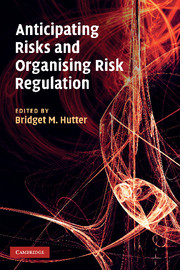Book contents
- Frontmatter
- Contents
- Contributors
- Preface
- Part I Introduction
- Part II Threat, vulnerabilities and insecurities
- Part III Social, organisational and regulatory sources of resilience and security
- 7 Regulating resilience? Regulatory work in high-risk arenas
- 8 Critical infrastructures, resilience and organisation of mega-projects: the Olympic Games
- 9 Creating space for engagement? Lay membership in contemporary risk governance
- 10 Bioethics and the risk regulation of ‘frontier research’: the case of gene therapy
- 11 Preparing for future crises: lessons from research
- 12 Conclusion: important themes and future research directions
- References
- Author index
- Subject index
12 - Conclusion: important themes and future research directions
Published online by Cambridge University Press: 10 November 2010
- Frontmatter
- Contents
- Contributors
- Preface
- Part I Introduction
- Part II Threat, vulnerabilities and insecurities
- Part III Social, organisational and regulatory sources of resilience and security
- 7 Regulating resilience? Regulatory work in high-risk arenas
- 8 Critical infrastructures, resilience and organisation of mega-projects: the Olympic Games
- 9 Creating space for engagement? Lay membership in contemporary risk governance
- 10 Bioethics and the risk regulation of ‘frontier research’: the case of gene therapy
- 11 Preparing for future crises: lessons from research
- 12 Conclusion: important themes and future research directions
- References
- Author index
- Subject index
Summary
The chapters in this volume underline the value of distinguishing between risk as a possible future happening and disasters as an already realised event. The important theoretical and analytical differences here have very real practical and policy implications. The chapters have considered how the anticipation of risks influences the way we organise policy systems. The range of cases we have covered have been broad-ranging and have taught us that it is important not to be too sweeping and to recognise that anticipating risk has more resonance in some domains and countries than others. There are parts of the modern world where risk has not been adopted as an organising category and domains where it does not prominently feature (Hood et al. 2001; Hutter 2004; cf. Huber, this volume). But in those domains and societies where anticipating risks has emerged as significant it may command massive attention and resources in the public and private sectors. We can make some generalisations but they are necessarily tentative and their variability demands further examination. Where the anticipation of risk is important we know that it can present opportunities for the growth of a risk management ‘industry’ within organisations, by consultancies and also by researchers. But attempts to anticipate risks are also frustrated by a series of fundamental dilemmas – how to balance anticipation and resilience; how much to rely on past events and how much on foreseeing novel risks; how to balance learning with prediction; and how to balance high expectations of manageability with pragmatic realities.
- Type
- Chapter
- Information
- Anticipating Risks and Organising Risk Regulation , pp. 249 - 264Publisher: Cambridge University PressPrint publication year: 2010
- 1
- Cited by



